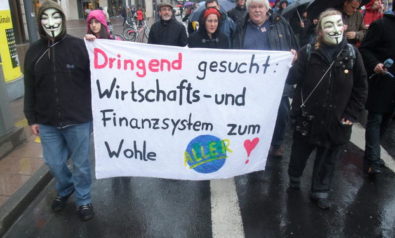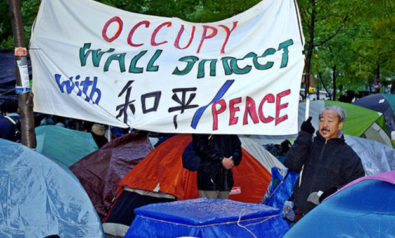Background
Occupy Wall Street (OWS) is an American-based protest turned global movement that began on September 17th, 2011, in Zucotti Park in New York City’s financial district. Started by the Canadian activist group Adbusters with the goal of bringing income inequality and the powerful role of corporations in the government and global economy to the forefront of public discourse, the movement now consists of thousands of protestors in hundreds of cities worldwide.
The OWS movement is not the first protest of its kind to draw wide attention and enter the public discourse. Preceded and inspired by (although not directly affiliated with) the 2010 Greek and Spanish austerity protests, British student protests, and the Arab Spring, OWS expresses great exasperation with the government and businesses’ inability to identify with the “99%”. With a broad list of demands, diverse protestor demographics, and thousands of blogs and groups that have found their mission statement in its cause, protestors have organized to say that the current status quo is no longer acceptable and that the gap between civic needs and government policy must be bridged. With high unemployment, debt loaded college graduates unable to find jobs, and corporate bonus packages that exceed an average family’s income, the basic fundamentals of what has driven society since WWII is being questioned.
Why is the Global Occupy Wall Street Movement relevant?
The global OWS Movement is relevant because it questions the foundations and daily operations of business and government practices that have been accepted and inadequately modernized to keep up with global practices. These practices have produced massive economic inequalities with the gap continuing to widen every year. Although a wide economic gap is not always frowned upon, especially in the US, it becomes real when one looks at the statistics. Between 1975 and 2006, average family income for the top 1% of US earners rose 80 times more than it did for the rest of the population. According to the 2010 census, almost half of Americans live below or slightly above the poverty line. Statistics like these are shocking considering that the US is one of the most developed and richest nations in the world. This begs the question, why is there such blind trust and minimal accountability standards for major corporations, businesses, and governments, whose daily transactions have managed to affect the living standards of entire populations?
Looking beyond the US, in regions such as Europe or South America, where economic and social safety nets are completely different, the demands of protestors have also managed to enter the political discourse. In Europe, the impact or rather non-impact of Occupy protests is a comment on how differently social and economic issues are handled in comparison to the US or South America. In South America, where corruption and income inequality take on different meanings in comparison to in the US and Europe, these protests offer a sobering perspective on who should be included in the global 99%. Despite the cause or list of demands, the OWS movement isn’t about siding with conservatives or liberals, choosing between capitalism or socialism, regulating business, or expecting to rid the world of corruption; it’s about rethinking and reevaluating business and government practices that haven’t been modernized to provide citizens with social and economic security in a global economy.
For more than 10 years, Fair Observer has been free, fair and independent. No billionaire owns us, no advertisers control us. We are a reader-supported nonprofit. Unlike many other publications, we keep our content free for readers regardless of where they live or whether they can afford to pay. We have no paywalls and no ads.
In the post-truth era of fake news, echo chambers and filter bubbles, we publish a plurality of perspectives from around the world. Anyone can publish with us, but everyone goes through a rigorous editorial process. So, you get fact-checked, well-reasoned content instead of noise.
We publish 2,500+ voices from 90+ countries. We also conduct education and training programs on subjects ranging from digital media and journalism to writing and critical thinking. This doesn’t come cheap. Servers, editors, trainers and web developers cost money.
Please consider supporting us on a regular basis as a recurring donor or a sustaining member.
Support Fair Observer
We rely on your support for our independence, diversity and quality.
Will you support FO’s journalism?
We rely on your support for our independence, diversity and quality.






